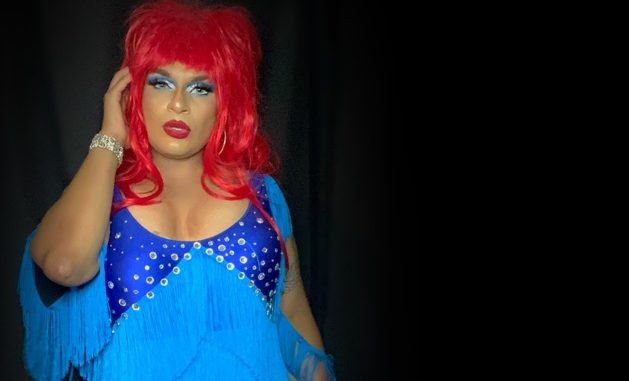
On cue, Sasha Mala looked directly at the audience and began to lip sync “React” by The Pussycat Dolls.
As they grabbed the camera, gazing at the viewers, Mala stood up moving their body to the beat.
It was easy to forget, for a moment, viewers were watching through their computer screens.
Friday evening marked the first time the Office of Institutional Diversity, Equity, Advocacy, and Leadership at Temple University held its annual Drag Show remotely on Zoom to wrap up the end of National Coming Out Week, a lineup of events geared toward supporting the LGBTQ community.
“We’ve had to completely switch out platforms to digital much like everyone else,” Kourtney Thompson, a graduate marketing and communications major who works with IDEAL, said. “The planning was a little bit different in terms of how we wanted to offer things because we looked at it as if we should just pre-record versus having live performances.”
This year, eight professional drag queens showcased their pre-recorded performances alongside a show by Temple’s student dance company “By Any Means Necessary” and a video from the cast of “RuPaul’s Drag Race,” a drag competition television show, explaining the history of drag.
Christina Peterson, a program coordinator for the Student Conduct and Community Standards Office, wanted to make sure the event had a similar feel as if it was in person, she said.
“Besides it being virtual and pre-recorded, there’s isn’t much of a difference,” she said. “The biggest difference you’ll see is a little more creativity because they worked really hard to create the videos that they’re sharing.”
The night’s host, Mala, a 2017 sociology alumna and drag performer, has been performing in virtual events since March of this year, so they were relatively comfortable with the idea of hosting a virtual drag show after planning it months in advance with IDEAL, they said.
“I’m really proud of everyone’s videos,” Mala added. “In the future, even when things start opening back up for live performances, I think it’s important that we continue to do digital stuff as well.”
In preparation for the event, Mala, who has been doing drag for nearly three years, styled their own wig and made their own costume, a turquoise and blue leotard with fringe.
“Drag allows me to get out of my shell and be more open about politics,” Mala said.
At the end of the night, participants voted for their first, second, and third favorite performances, Peterson said. Juan Avila, a performer who goes by Juan Quit, took home first place this year.
Joseph Juhase, a drag performer who goes by D. Nile, said while nothing can replace a live show experience, he enjoys digital drag show events since it’s given him more creativity and ability to explore what he wants to do with his character, like incorporating inspiration from movies and music videos into his persona.
“I think it’s good because it provides so much more accessibility, especially nowadays,” he added. “It’s nice you can enjoy it from the safety of your home.”
Performing in drag shows allowed Juhase to express himself in a new way, and gave him a sense of belonging through the drag community, he said.
“It makes me feel good, excited to meet new people, and makes me a lot less anxious or nervous about coming into a new situation,” he said. “It’s almost like wearing armor.”
Seth Wohl, a sophomore vocal performance major, said the style of drag was a lot different this year than in previous years.
“I remember last year there was a lot of dancing and voguing but this year was a lot more comedy and camp,” Wohl said. “It was a good change, and I liked it.”
Joseph Blocker, who goes by Heavens 2 Betsy and performed Friday night, began hisdrag career after growing a liking to RuPaul Drag Race. Since then, his passion grew once he began performing at local events.
“It’s an expression, and it’s not just men dressing up as women,” Betsy said. “It’s more than that. It’s an art form.”


Be the first to comment